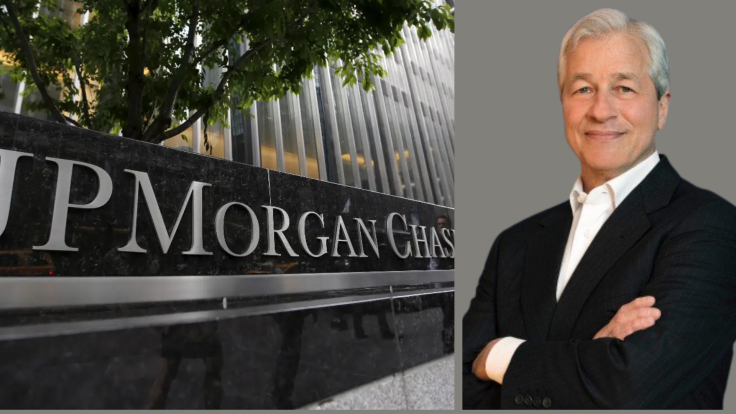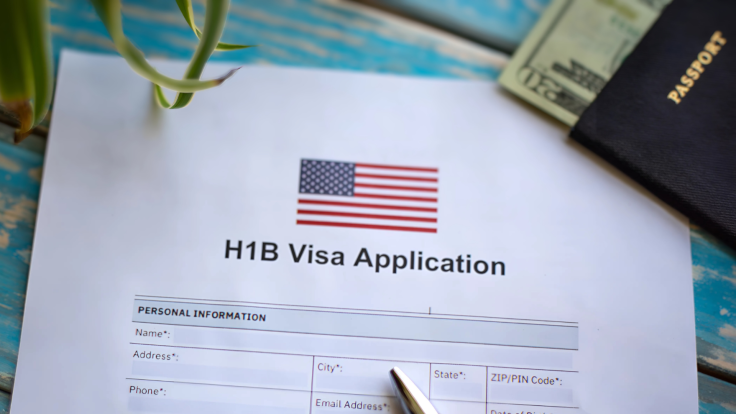Will Donald Trump's Visa Crackdown Backfire? JPMorgan CEO Jamie Dimon 'Begs' POTUS Over 'Damaging' New H-1B Visa Rules
Dimon argues the visa crackdown could discourage innovation and push firms to offload roles overseas — even as Trump doubles down on immigration reform.

Corporate leaders are mobilising against President Donald Trump's surprise $100,000 fee on new H-1B visa petitions, with JPMorgan Chase CEO Jamie Dimon warning the policy could cripple American companies' ability to compete for global talent.
The proclamation, signed on Friday, 19 September in the Oval Office, sent shockwaves through Silicon Valley and Wall Street. Tech giants, including Amazon, Microsoft and Meta, scrambled to advise employees abroad to return immediately, whilst financial institutions assessed potential costs running into hundreds of millions.
'That caught everyone off guard,' Dimon told CNBC-TV18. 'And so we had a lot of phone calls over the weekend. What does it mean?'
Business Insider reported that Dimon was among several leaders warning that the changes could harm American companies that depend on specialised expertise.
How Trump's Immigration Overhaul Works
The new policy imposes a one-time $100,000 fee on each new H-1B petition, targeting employers who hire foreign skilled workers. The fee will first apply in the upcoming lottery cycle for new applicants, according to a White House official who clarified the rules after initial confusion.
Commerce Secretary Howard Lutnick initially described it as an annual charge before the administration corrected course, confirming it applies only to new applications. The measure takes effect immediately, though existing visa holders and renewals remain exempt.
The H-1B programme currently caps new visas at 65,000 annually, with an additional 20,000 reserved for advanced degree holders. Indian nationals account for nearly three-quarters of the permits, prompting the Indian government to express particular concern about the changes.
The policy takes effect in late September and affects firms nationwide. It has drawn strong objections from both the technology and financial sectors, which are among the heaviest users of H-1B visas.

Wall Street Banking Giants Face Mounting Costs
JPMorgan Chase, one of the top 10 companies in the US that sponsors visas, has 2,440 employees with H-1 B visas, facing substantial financial implications. The bank relies heavily on international talent for specialised roles across technology and finance divisions.
'I would beg the president. He has accomplished border control—that's great. I mean, I think all nations want real border control; that helps make a nation. But after that, we should have good immigration,' Dimon stated during his India visit.
The JPMorgan chief expects significant resistance from corporate America. Major employers use the programme 'because they need the expertise', he emphasised, challenging the administration's assertion that companies exploit the system for cheap labour.
Silicon Valley Tech Companies Sound Alarm
Amazon leads all US companies with more than 10,000 H-1B visas approved in 2025, followed by Microsoft and Meta, which each have over 5,000. These firms immediately warned travelling employees to return before midnight Saturday, creating chaos at airports worldwide.
Rohan Singh, a manufacturing engineer in North Carolina, cancelled his plan to visit India, saying there was 'panic among H-1B visa holders.' Similar stories emerged on social media platforms as workers abandoned holidays and business trips.
The technology sector argues that the programme fills critical skill gaps. Critics counter that most H-1B employers do pay migrant workers less than market-rate salaries, according to a 2020 study by the Economic Policy Institute.
Global Talent Competition Intensifies
International rivals see opportunity in America's restrictive stance. Barney Hussey-Yeo, CEO of British artificial intelligence startup Cleo, described Trump's abrupt change to the H-1B visa programme on Monday as 'an unprecedented opportunity', reporting over 1,000 enquiries from US-based tech workers considering relocation.
European venture capitalist Harry Stebbings called it 'the greatest opportunity' for Europe, urging the UK to become the default destination for displaced talent. Dubai, Singapore and other tech hubs are similarly positioning themselves as alternatives.
The policy's timing proves particularly challenging as companies face acute labour shortages in artificial intelligence, cybersecurity and software development. Industry analysts warn that the restrictions could accelerate offshoring rather than create American jobs.
What Financial Services Leaders Watch Next
JPMorgan plans to engage with policymakers whilst assessing alternative visa routes and faster green card sponsorships. 'For us, visas matter because we move people around globally - experts who get promoted to new jobs in different markets,' Dimon explained.
Legal challenges appear likely, with immigration lawyers questioning Congressional authorisation for such fees. The US Chamber of Commerce expressed concern about impacts on families and employers, promising to work with the administration on solutions.
The administration maintains that the policy will ensure only the highest-skilled workers enter America. Critics warn it may instead ensure they go elsewhere entirely.
Whether Dimon's warning will sway the administration remains unclear. For now, the rollout of the $100,000 fee signals a new and uncertain phase for America's skilled immigration system and one that global employers will be watching closely.
© Copyright IBTimes 2025. All rights reserved.





















